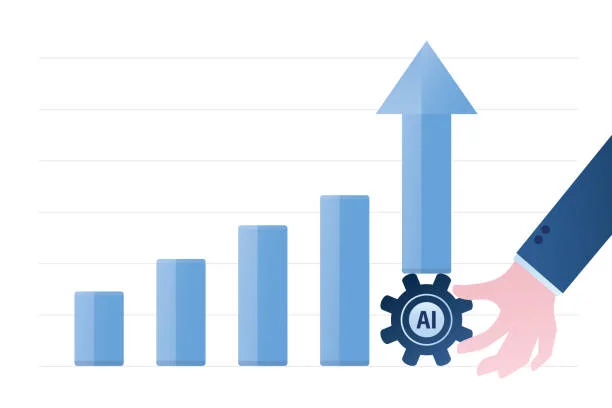Artificial Intelligence (AI) is no longer just a futuristic concept, it’s shaping how we work, learn, and grow. From automating routine tasks to driving critical business decisions, AI has become a part of almost every industry. And professionals who understand how to use AI effectively are discovering something powerful, these skills can transform their career paths.
Whether you’re an engineer, marketer, teacher, or finance professional, learning AI today can open doors to new opportunities. Let’s explore how AI skills are changing career trajectories, why employers value them so highly, and how AI courses can help you get there.
Discover insights your peers are reading—check out this related post now!
1. The Rising Demand for AI Skills
Over the past few years, AI has become a core part of digital transformation strategies. According to multiple global surveys, companies across sectors, from IT and banking to healthcare and logistics, are prioritizing AI adoption.
This rapid shift means one thing: AI literacy is now as important as computer literacy was two decades ago. Professionals who can understand, interpret, and apply AI in their domain are becoming more valuable to employers.
Some of the most in-demand AI-related roles today include:
- AI Engineer / Machine Learning Engineer
- Data Scientist or AI Analyst
- Automation Specialist
- AI Product Manager
- Prompt Engineer / AI Trainer
- Business Analyst (AI-Driven Decision Support)
But you don’t need to be a full-time AI specialist to benefit. Understanding AI concepts and tools, even at a foundational level, can make you more effective in almost any role.
2. How AI Skills Reshape Career Growth
a. New Career Opportunities
AI has created entirely new job categories that didn’t exist five years ago. Professionals who upskill now can move into emerging roles in data analytics, automation, and intelligent systems design.
For example:
- A marketing manager with AI knowledge can move into AI-driven customer analytics or growth strategy.
- A software developer can evolve into a machine learning engineer or AI solutions architect.
- An HR professional can specialize in AI-based talent analytics.
Learning AI gives you flexibility, it allows you to pivot to roles that are growing faster than traditional ones.
b. Better Decision-Making Skills
AI isn’t just about coding or algorithms; it’s about smarter thinking. Professionals trained in AI learn how to use data insights to make informed decisions. Whether it’s predicting market trends or optimizing business processes, AI skills help you see patterns and possibilities others might miss.
This analytical mindset makes you more valuable to your organization and strengthens your leadership potential.
c. Increased Productivity and Creativity
AI tools can handle repetitive work, generating reports, analyzing documents, or drafting content, giving you more time for strategic and creative tasks.
By understanding how to use these tools effectively, professionals can focus on problem-solving, innovation, and collaboration. In short, AI doesn’t replace creativity, it amplifies it.
3. The Role of AI Courses in Career Growth
Learning AI doesn’t have to mean going back to school full-time. Today, you can access high-quality AI courses designed for professionals at every level, from beginners to senior managers.
These programs teach both the technical foundations and the real-world applications of AI, helping you connect theory with practice.
What You Can Learn in AI Courses
Most online artificial intelligence courses cover topics such as:
- Machine Learning basics (how AI learns from data)
- Natural Language Processing (NLP) and ChatGPT-like models
- Computer Vision and image recognition
- Data analytics and predictive modeling
- Ethical AI and responsible use of technology
- Real-world case studies from industries like finance, healthcare, and retail
The focus is on practical, business-ready AI, not just coding. This makes it suitable even for non-technical professionals.
4. AI Skills for Non-Tech Professionals
One of the biggest myths is that AI is only for coders or data scientists. In reality, AI skills are relevant across all job functions.
Here’s how different professionals can use AI knowledge:
- Marketing & Sales: Use AI tools to analyze customer behavior, predict demand, and personalize campaigns.
- Finance & Operations: Leverage AI for fraud detection, risk management, and process optimization.
- Human Resources: Apply AI in recruitment analytics, workforce planning, and employee engagement.
- Education & Training: Use AI-based tools for personalized learning and content creation.
- Healthcare: Understand how AI supports diagnostics, patient care, and clinical research.
Even if you’re not building AI systems, knowing how they work gives you an edge in decision-making and collaboration.
5. How AI Skills Boost Career Resilience
The job market is evolving faster than ever. Automation is reshaping tasks, and professionals who fail to adapt risk being left behind. But those with AI knowledge become future-proof.
Here’s how AI skills make your career more resilient:
- Adaptability: You can pivot to new roles as technology evolves.
- Relevance: You stay aligned with your industry’s digital transformation.
- Visibility: Employers see you as proactive and forward-thinking.
- Confidence: You can lead AI-driven projects with a clear understanding of how they work.
In short, AI skills don’t just help you survive change, they help you lead it.
6. Choosing the Right AI Course
If you’re planning to start your AI journey, choose a course that matches your career goals.
Look for programs that offer:
- A mix of concepts and hands-on projects.
- Real-world case studies relevant to your industry.
- Mentorship or industry interaction.
- Certification that’s recognized by employers.
Many top institutes and online platforms now offer online AI courses that fit into busy professional schedules, from self-paced learning to live, instructor-led programs.
7. The Future Belongs to AI-Smart Professionals
AI is not replacing people, it’s changing what people can do. Professionals who understand AI will have a stronger voice in shaping the future of work.
The next generation of leaders will be those who can combine human judgment with AI-driven insights. And the journey begins with one step: learning the language of AI.
If you’re looking to move your career forward, explore an AI course that fits your goals. A few hours a week of focused learning can change how you work, and where your career goes next.
Final Thoughts
AI skills are the new professional currency. They don’t just add value to your resume, they redefine your potential.
Whether you’re starting your career, aiming for a promotion, or planning a shift to a new field, learning AI will keep you relevant, competitive, and confident in the digital era.
Start exploring online artificial intelligence courses today, because in the age of AI, the smartest investment you can make is in your own skills.
Don’t miss our featured post—expert insights that spark inspiration instantly!





